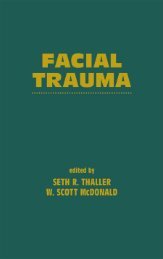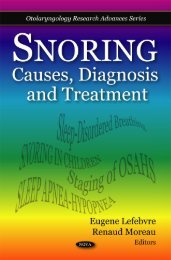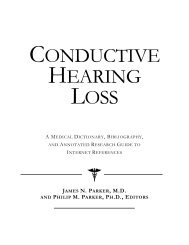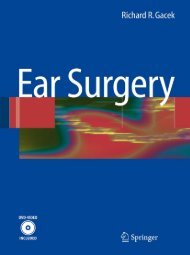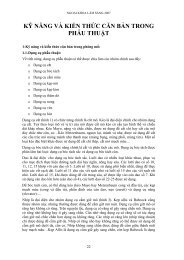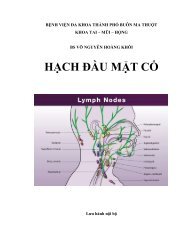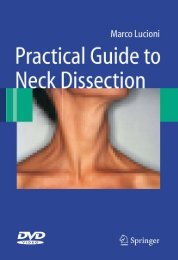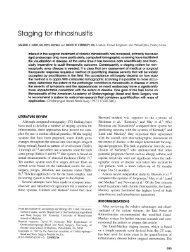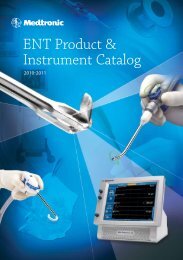Familial Nasopharyngeal Carcinoma 6
Familial Nasopharyngeal Carcinoma 6
Familial Nasopharyngeal Carcinoma 6
- No tags were found...
You also want an ePaper? Increase the reach of your titles
YUMPU automatically turns print PDFs into web optimized ePapers that Google loves.
Systemic Treatment for Incurable Recurrent and or Metastatic <strong>Nasopharyngeal</strong> <strong>Carcinoma</strong> 273studies involved ex vivo expansion of EBV-specificCTLs through stimulation with EBV-transformedlymphoblastoid cell lines. Combining data from thetwo trials, infusion of CTLs resulted in two completeand three partial responses in a total of 16 patientswith measureable disease, with response duration of3–23 months. Moreover, two patients with stable diseasewere progression-free for 14 and 15 months. Theonly toxicity identified was grade 1–2 inflammatoryreaction at tumor sites in three patients. Clearly, thisapproach is worthy of additional study and these areongoing. Efficacy may be improved by cytoreducingwith chemotherapy prior to CTL infusion and mightbe best applied to patients at high risk of progressionfollowing definitive therapy. Studies to define the optimalapproach are also ongoing, selecting for dendriticcells, for example, and defining ways to enhance EBVspecificimmunity. Other immunotherapy approachesare also under study (Lin et al. 2002).21.5SummaryCytotoxic chemotherapy remains the treatment ofchoice for patients with recurrent or metastatic NPC.In the past 5–10 years taxanes and gemcitabine havedemonstrated substantial efficacy and have beenadded to the armamentarium with platinating agentsand fluoropyrimidines. At this time, platin-baseddoublets appear to be generally well tolerated and ofpalliative benefit. More aggressive multidrug regimenshave been poorly tolerated and are not recommendedoutside of a trial setting. Monotherapy with anew class of agent can be considered as second- orthird-line therapy in patients with retained performancestatus. Randomized clinical trials for patientswith incurable NPC are needed and should stratifybased on known prognostic factors, considering theheterogeneity in the population. Targeted therapy inNPC is to a great extent uncharted territory, and clinicaltrials, based on sound preclinical rationale, areclearly needed. Given the near universal associationwith EBV, viral-based adoptive immunotherapy isattractive and limited experience suggests promiseand lack of significant toxicity. This approach is thesubject of ongoing and planned investigation.However, current approaches are quite expensive andrequire a high level of technical expertise; this is prohibitiveto broad clinical application or even largescaleclinical trials. Development of an internationalconsortium at centers of excellence may help overcomethese obstacles to progress.ReferencesAiroldi M, Pedani F, Marchionatti S, et al (2002) Carboplatinplus taxol is an effective third-line regimen in recurrentundifferentiated nasopharyngeal carcinoma. Tumori 88(4):273–276Au E, Ang PT (1994) hase II trial of 5-fluorouracil and cisplatinumin recurrent or metastatic nasopharyngeal carcinoma.Ann Oncol 5(1):87–89Au E, Tan EH, Ang PT (1998) Activity of paclitaxel by threehourinfustion in Asian patients with metastatic undifferentiatednasopharyngeal cancer. Ann Oncol 9:327–329Boussen H, Cvitkovic E, Wendling JL, et al (1991) Chemotherapyof metastatic and/or recurrent undifferentiated nasopharyngealcarcinoma with cisplatin, bleomycin, and fluorouracil.J Clin Oncol 9(9):1675–1681Chan ATC, Teo PML, Johnson PJ (2002) <strong>Nasopharyngeal</strong> carcinoma.Ann Oncol 13(7):1007–1015Chan AT, Hsu MM, Goh BC, et al (2005) Multicenter, phase IIstudy of cetuximab in combination with carboplatin inpatients with recurrent or metastatic nasopharyngeal carcinoma.J Clin Oncol 23(15):3568–3576Chan AT, Lo YM, Zee B, et al (2002) Plasma Epstein–Barr virusDNA and residual disease after radiotherapy for undifferentiatednasopharyngeal carcinoma. J Natl Cancer Inst94(21):1614–1619Chitapanarux I, Lorvidhaya V, Kamnerdsupaphon P, et al(2007) Chemoradiation comparing cisplatin versus carboplatinin locally advanced nasopharyngeal cancer: randomized,non-inferiority, open trial. Eur J Cancer 43:1399–1406Chua DT, Nicholls JM, Sham JS, et al (2004) Prognostic value ofepidermal growth factor receptor expression in patientswith advanced stage nasopharyngeal carcinoma treatedwith induction chemotherapy and radiotherapy. Int J RadiatOncol Biol Phys 59(1):11–20Chua DT, Sham JS, Au GK (2005) A phase II study of docetaxeland cisplatin as first-line chemotherapy in patients withmetastatic nasopharyngeal carcinoma. Oral Oncol 41:589–595Chua DT, Wei WI, Wong MP, et al (2008) Phase II study of gefitinibfor the treatment of recurrent and metastaticnasopharyngeal carcinoma. Head Neck 30(7):863–867Chua D, Wei WI, Sham JS, et al (2008) Capecitabine monotherapyfor recurrent and metastatic nasopharyngeal cancer.Jpn J Clin Oncol 38(4):244–249Comoli P, Pedrazzoli P, Maccario R, et al (2005) Cell therapy ofstage IV nasopharyngeal carcinoma with autologousEpstein–Barr virus-targeted cytotoxic T lymphocytes.J Clin Oncol 23:8942–8949Fandi A, bachouchi M, Azli N, et al (2000) Long-term diseasefreesurvivors in metastatic undifferentiated carcinoma ofnasopharyngeal type. J Clin Oncol 18:1324–1330Foo KF, Tan EH, Leong SS, et al (2002) Gemcitabine in metastaticnasopharyngeal carcinoma of the undifferentiatedtype. Ann Oncol 13(1):150–156



